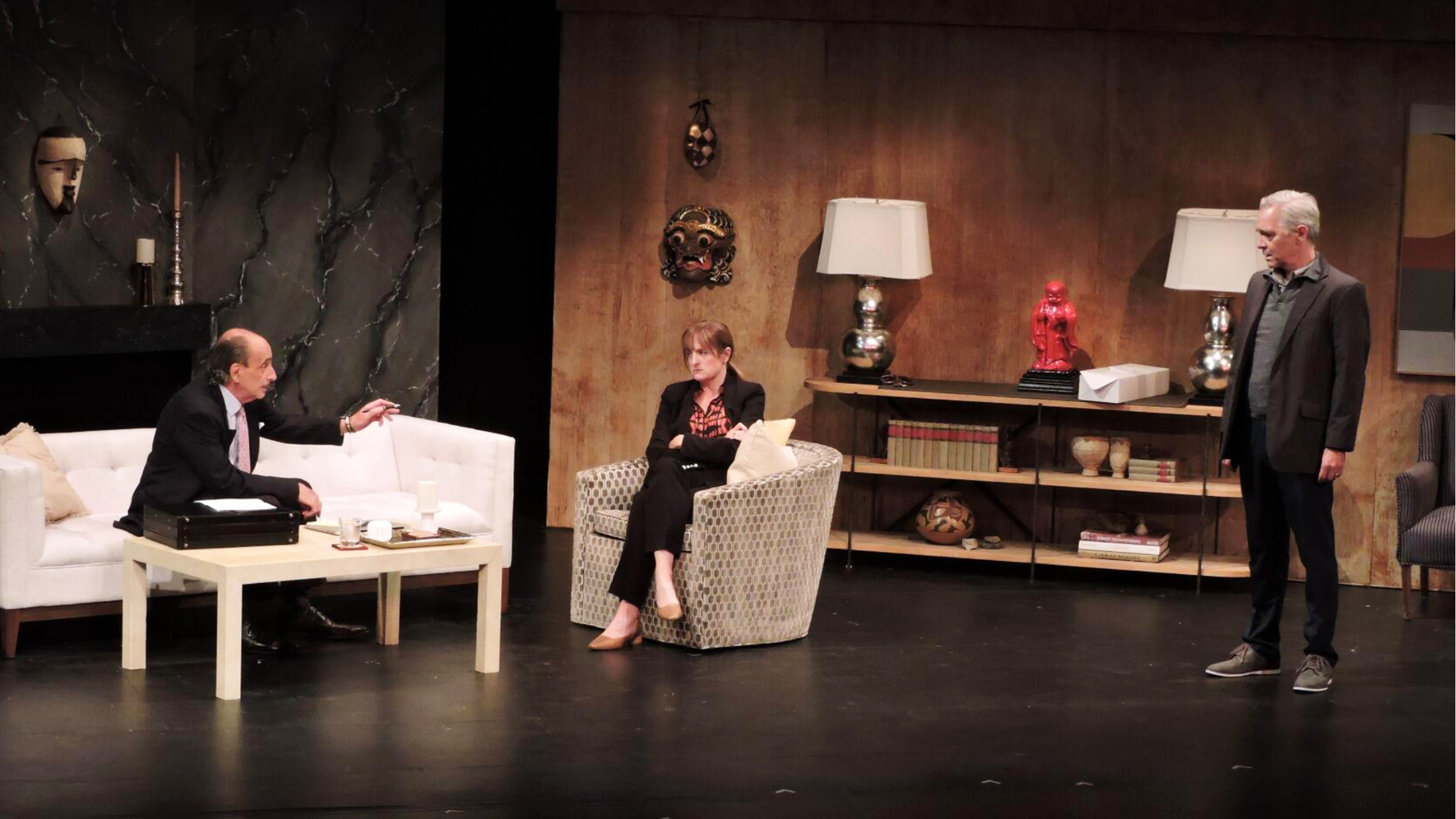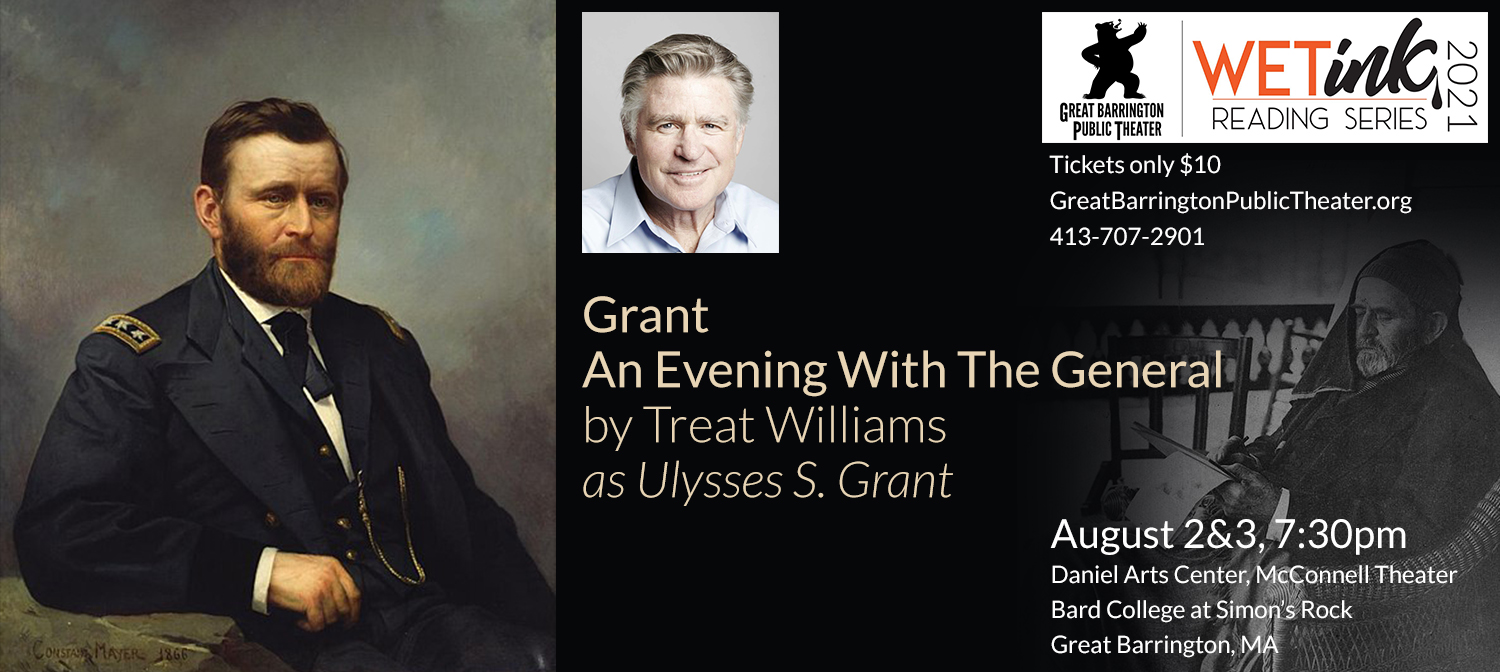(From left) William LeBow, as Mr. Stone, Keira Naughton, as Joan, and David Adkins, as Alan, in The Christopher Boy’s Communion. Photo courtesy Great Barrington Public Theater.
What do we do with David Mamet?
His place in the firmament is more or less secure, having graduated to one-name status long ago. Audience members at the Great Barrington Public Theater’s production of The Christopher Boy’s Communion are more likely to refer to the author’s surname — as in “the new Mamet” — than the actual title of the play.
Each of us arrives at the Daniels Arts Center with our own history. One might have sat awkwardly through an off-off-Broadway (or off-Loop, since it was actually in the Windy City) production of Sexual Perversity in Chicago; thrilled to the big-screen exploits of The Heist; flipped guiltily through The Diary of a Porn Star or angrily through The Secret Knowledge: On the Dismantling of American Culture; or cued up monologues from Glengarry Glen Ross as a means to jumpstart a languishing career in sales. (I will leave it up to Glass readers to speculate on which of these things I have done and which I have simply imagined.)
Perhaps this versatility makes it hard to fit his oeuvre into easy categories. We know what to do with a text from Tony Kushner or Toni Morrison, as with Edward Albee or Spike Lee. But a new offering from David Mamet?
This is certainly not for a lack of output. The past decade has seen a feature film (Phil Spector), four books and five plays, along with any number of commentaries, twitter-fights, etc. Mamet’s open support of the former president is not likely to have generated much support in the theater world, and one imagines that the Santa Monica crowd has generally chosen to avoid politics when this pugnacious neighbor arrives. But he is still writing and, as such, still seeking an audience with which to share his idiosyncratic style.
By my count, The Christopher Boy’s Communion is David Mamet’s thirty-ninth published play. He rolled out his latest with a quiet Los Angeles premiere: a two-week run in February 2020 featuring William H. Macy and Fionnula Flanaghan, as well as Mamet’s multi-talented wife Rebecca Pidgeon. Pidgeon played Joan, the protagonist, a mother who will resort to any means necessary to protect her son. The LA Times observed that the play, “a reworking of an old myth about the bartering of a soul,” offers “some of the old black magic” that Mamet could conjure at the height of his powers, yet the premiere seemed “a draft or two away from realizing its sinister promise.”
A radio version followed in March 2021, debuting on BBC 4 in a low-profile afternoon slot. According to The Guardian, “The drama breaks out from the everyday into baroque territory [and] bears the sense of a gripping new work that is not quite finished yet.” Flanaghan and Pidgeon carried over from the Los Angeles stage to the London airwaves, bringing continuity and cache in the process.
The local cast, while lacking that sort of star power, is nevertheless quite capable. Keira Naughton, David Adkins, Will LeBow and company shine under the deft direction of Jim Frangione, Artistic Director for GBPT, who has himself engaged with Mamet’s material in various modes in his own distinguished career.
In a percussive moment from a memorable monologue, a self-assured alpha male urges his listeners to “Get them to sign on the line which is dotted.” This comes from the iconic Always Be Closing speech in Glengarry Glen Ross. We might offer up a dramatist’s adaptation as we head into the closing weekend of the show: “Get them to sit in the seats for which they’ve paid.” (At last check, there are tickets available for Friday, Saturday, and Sunday. https://www.greatbarringtonpublictheater.org/the-christopher-boys-communion)
What has this singular American author offered us with his latest? Who will show up to find out? And what, ultimately, do we do with David Mamet?
I can’t wait to find out. Send along your thoughts via the usual social media channels and/or the Reply button below.
[broadstreet ad=”387863″]
















